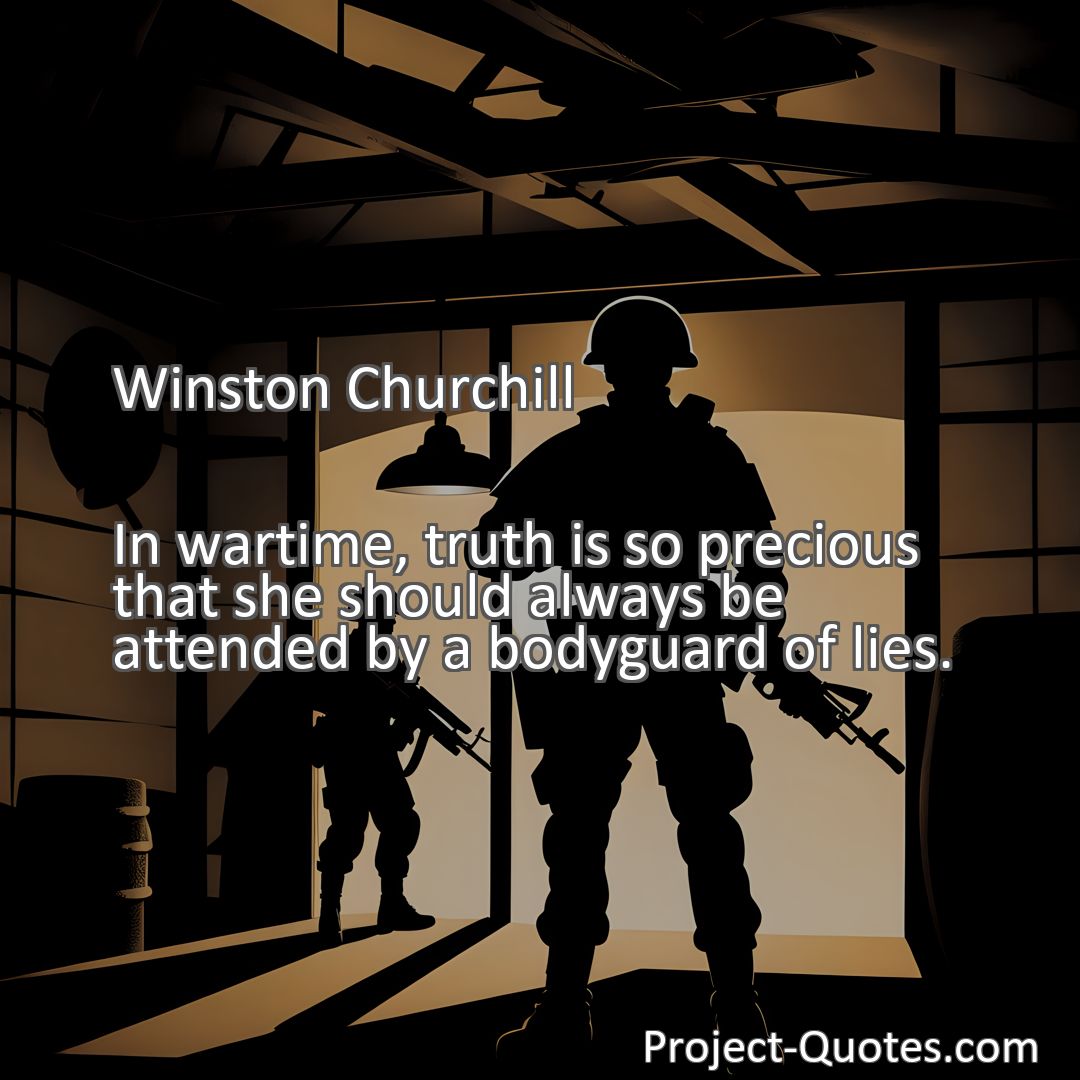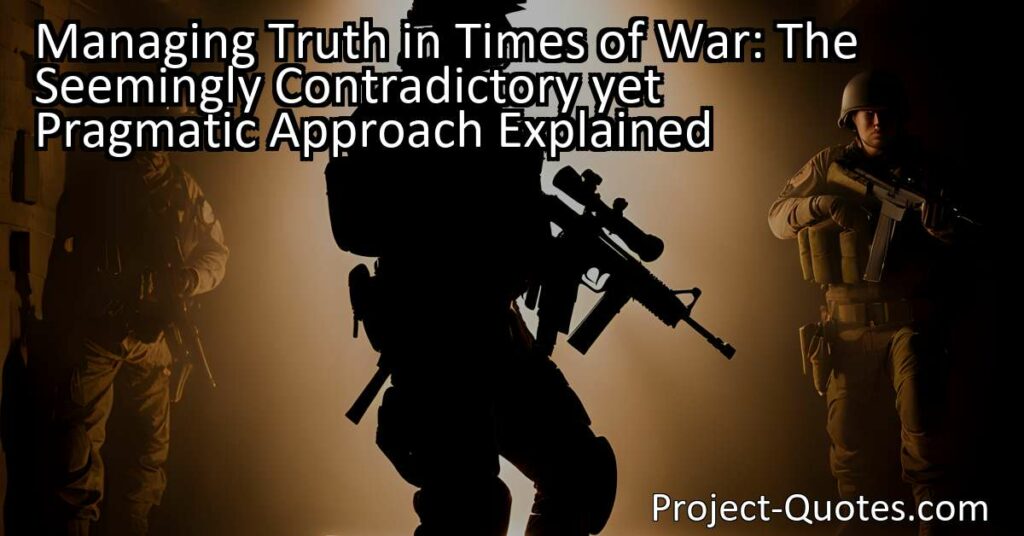In wartime, truth is so precious that she should always be attended by a bodyguard of lies.
Winston Churchill
In times of war, managing truth becomes a seemingly contradictory yet pragmatic approach. The concept of a “bodyguard of lies” is employed to protect the truth from being corrupted or exploited, ensuring its ultimate triumph. While it challenges our understanding of honesty, this approach is justified in defending a greater truth and preserving national security.
Table of Contents
Meaning of Quote – In wartime, truth is so precious that she should always be attended by a bodyguard of lies.
In times of war, the concept of truth becomes complex and delicate, as highlighted by the famous quote, “In wartime, truth is so precious that she should always be attended by a bodyguard of lies.” This powerful statement, often attributed to Winston Churchill, encapsulates the intricacies and paradoxes of truth in the midst of conflict.
War, by its very nature, breeds uncertainty and chaos. It engenders fear, confusion, and a constant struggle between opposing forces. In such circumstances, the absolute truth becomes elusive, and the narrative can easily be manipulated for strategic and political purposes. Hence, the idea of truth being guarded by lies emerges as a seemingly contradictory yet pragmatic approach to navigate through the turmoil of war.
One can interpret this famous quote in multiple ways, recognizing the various layers and implications it carries. On one hand, it implies that truth alone may not be sufficient to win a war or protect the greater good. Sometimes, it becomes necessary to employ deception and misinformation as a means to safeguard the truth itself. This notion challenges our conventional understanding of honesty and integrity, as it suggests that lies can be instrumental in ensuring the triumph of truth in the long run.
The idea of a “bodyguard of lies” can be seen as a metaphorical shield, guarding the fragile truth from being corrupted, exposed, or exploited. It represents a strategic maneuver employed by governments, military commanders, and intelligence agencies when faced with the daunting task of managing information in the midst of war. These lies, or deliberately crafted narratives, serve as camouflage, diverting attention and confusing the enemy. By doing so, the truth remains shielded and intact, ready to be revealed when the time is ripe.
However, it is crucial to note that this strategic use of lies does not absolve individuals or institutions of their ethical responsibilities. The intention behind the “bodyguard of lies” should always be to protect a greater truth or to secure the safety of innocent lives. Justification for deception, manipulation, or misinformation lies in the defence of a higher purpose, such as preserving democracy, ensuring national security, or protecting the vulnerable.
While this approach may seem morally ambiguous, it forces us to confront the realities of war and the compromises it demands. In the face of imminent peril, the preservation of truth demands a delicate balance between honesty and strategic deception. It is essential to recognize that this concept applies not only to military operations but also to political discourse and public opinion during times of conflict.
Throughout history, we can find numerous examples where the manipulation of truth played a significant role in shaping the outcome of wars. World War II stands as a prime example of the intricate relationship between truth and lies. In this global conflict, both sides heavily relied on propaganda to influence public opinion, gain support, and demoralize their adversaries.
On the Allied side, Churchill recognized the importance of a well-crafted narrative to maintain public morale and project an image of strength. His speeches and radio broadcasts served as powerful tools to inspire hope and resilience among the British population. Despite the hardships experienced during the war, he eloquently conveyed a sense of unwavering determination and belief in ultimate victory.
Similarly, the Axis powers, led by Adolf Hitler’s Nazi regime, constructed a web of deceit and misinformation to control their citizens and justify their aggression. Propaganda played a central role in perpetuating the myth of Aryan supremacy and demonizing targeted groups, ultimately leading to further atrocities and crimes against humanity.
In closer examination, the “bodyguard of lies” can also be seen as a reflection of the broader complexities of truth itself. In any given situation, truth is subjective and multifaceted, influenced by personal biases, cultural contexts, and power dynamics. What may be true for one party might not be perceived as truth by another. War magnifies these complexities, often blurring the line between fact and fiction.
Moreover, the quote emphasizes the scarcity and vulnerability of truth during war. The sheer magnitude of violence, destruction, and manipulation can make it challenging to discern the truth amidst the chaos. The fog of war further obscures reality, making it difficult to differentiate between genuine information and deliberate falsehoods.
In our contemporary world, where information travels at unprecedented speeds, the challenges of managing truth in times of war have evolved. The advent of digital communication and social media has expanded the battlefield of information, amplifying the potential for manipulation and disinformation. State actors, terrorist organizations, and even individuals can exploit these platforms to spread lies, sow discord, and shape public perception.
In conclusion, the quote, “In wartime, truth is so precious that she should always be attended by a bodyguard of lies,” encapsulates the complex dynamics of truth during times of conflict. It underscores the paradoxical relationship between truth and deception, challenging our conventional understanding of honesty and integrity. While the strategic use of lies can be justified as a means to protect a greater truth or preserve national security, it should never be employed for unethical purposes. In the information age, where misinformation proliferates, the importance of defending truth becomes paramount. By understanding the precarious balance between truth and lies, we can navigate the complexities of war and strive for a more transparent and just society.
I hope this quote inspired image brings you hope and peace. Share it with someone who needs it today!


